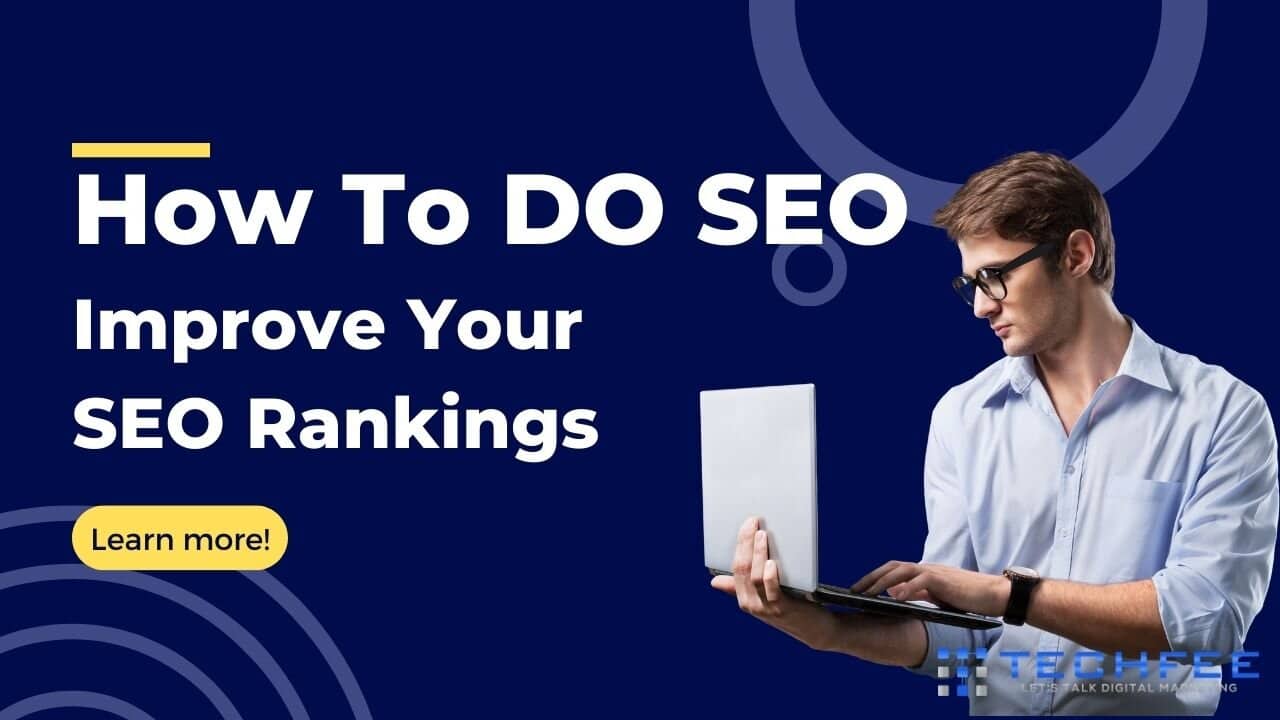Are you looking to boost your website’s visibility and increase organic traffic? Okay! To grow your website’s visibility and ranking a website, you must dive into the depth of Search Engine Optimization. In this article, we will cover the basics of SEO, setting up SEO, SEO strategies, and Best Practices and provide valuable insights on how to do SEO to enhance your website’s rankings on search engine results pages.
So, learn how to SEO and take your online presence to new heights! This is a comprehensive SEO tutorial for beginners to experts.
SEO is optimizing your website to increase visibility and rank higher on search engine results. By strategically using relevant keywords, creating high-quality content, and building authoritative backlinks, you can significantly improve your chances of appearing on the first page of search results.
Whether you’re a business owner, a blogger, or a digital marketer, mastering SEO techniques can drive your online presence and increase valuable organic traffic.
By implementing effective SEO practices, you can position your website as a helpful resource in the eyes of search engines. This article will be long because we will share detailed and in-depth knowledge of how to do SEO yourself.
So, continue reading as we delve deeper into the realm of SEO, providing you with expert tips and actionable strategies. We will also simplify the complexities of SEO and guide you toward online success.
Therefore, without any confusion, let’s embark on an exciting journey through the world of SEO
Let’s get started!
Remember, SEO is not just about increasing traffic; it’s about earning the right traffic that aligns with your target audience and business goals. So, we will discuss only white hat search engine optimization to boost the ranking of a website.
Basics of SEO
What Is SEO And How It Works
Search Engine Optimization (SEO) plays a crucial role in the digital marketing landscape. Let us explain to you how to do SEO in digital marketing.
It encompasses optimizing websites and online content to enhance their visibility and rankings on search engine results pages (SERPs) and understanding the mechanics of how search engines crawl and index web pages is at the core of SEO, enabling experts to leverage this knowledge to improve a website’s relevance and authority.
The process entails various strategies, including thorough keyword research, on-page optimization, link building, and compelling content creation.
By implementing effective SEO techniques, websites can attract more organic traffic, increasing their online visibility, conversions, and revenue.
It’s important to note that SEO is an ongoing endeavor that demands constant monitoring and adaptation to stay ahead of the competition and maintain a solid online presence.
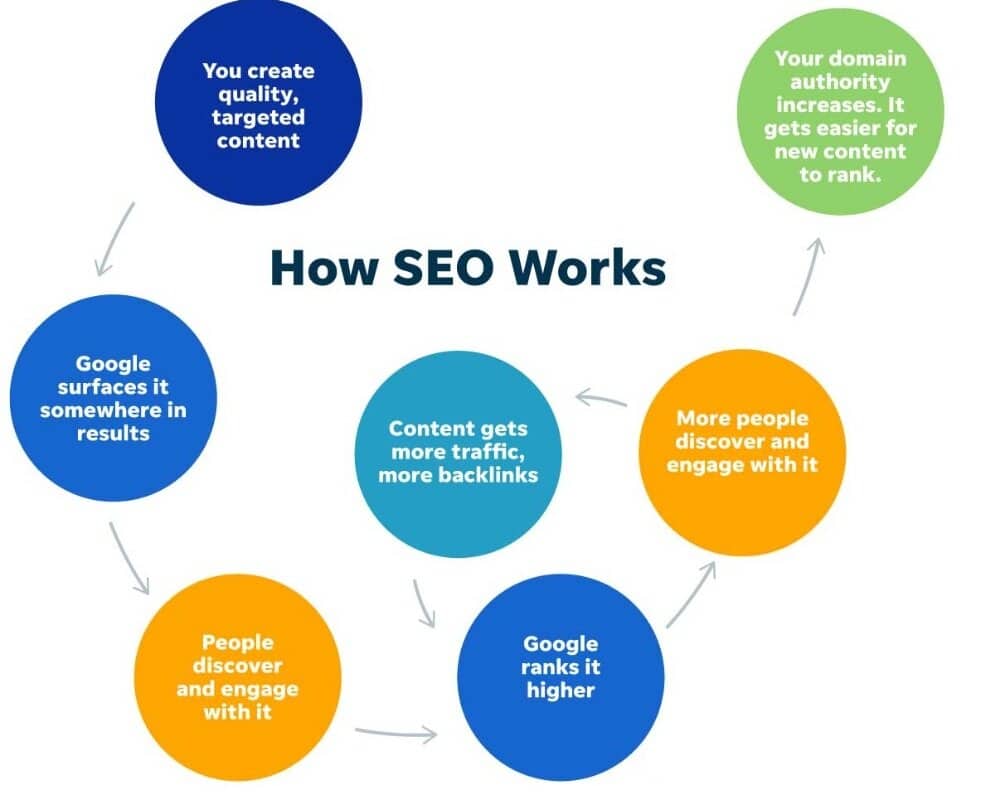
Types of SEO
Search engine optimization (SEO) involves a range of strategies and techniques to improve a website’s visibility and ranking on search engine results pages. Several critical approaches can be considered regarding different types of SEO.
One necessary type is ON-PAGE SEO, which optimizes individual web pages to make them more relevant and authoritative for specific keywords. This includes optimizing meta tags, headings, content, and URL structures to ensure they are search engine-friendly. On-page SEO also involves image optimization, improving page load speed, and implementing structured data markup.
Another type is OFF-PAGE SEO, which involves activities outside the website itself. The primary focus is on building high-quality backlinks from reputable websites to enhance the website’s authority and credibility in the eyes of search engines. Off-page SEO encompasses social media marketing, influencer outreach, and online reputation management.
TECHNICAL SEO is another vital aspect, as it concentrates on optimizing the technical elements of a website to improve crawling, indexing, and overall performance. This includes improving website speed, ensuring proper website structure and navigation, optimizing XML sitemaps and robots.txt files, implementing canonical tags, and enhancing mobile-friendliness and responsiveness.
LOCAL SEO is specifically geared towards improving a website’s visibility in location-based searches, particularly for businesses with physical locations or those targeting specific geographical areas. It involves optimizing Google My Business profiles, managing online reviews, creating location-specific content, and maintaining consistency across online directories.
Lastly, E-COMMERCE SEO is explicitly designed for online stores to enhance their visibility and rankings on search engine results pages. It involves optimizing product pages, improving user experience and navigation, implementing schema markup for product information, and optimizing product descriptions and titles with relevant keywords.
By utilizing these different types of SEO, businesses can develop a comprehensive strategy to enhance their online presence, attract organic traffic, and achieve tremendous success in the digital landscape.
What Is SEO Marketing
SEO marketing, also called Search Engine Optimization marketing, is pivotal in boosting online visibility and driving organic website traffic. It contains a range of strategies to optimize various website elements, including content, keywords, meta tags, and backlinks, aiming to improve its position on search engine results pages (SERPs).
The significance of effective SEO marketing cannot be exaggerated as it enables businesses to attract highly targeted visitors actively searching for products or services relevant to their industry. By securing higher rankings in search engine results, companies can establish credibility, build trust, and enhance brand recognition.
However, it’s crucial to note that SEO marketing is an ongoing process that requires detailed research, comprehensive data analysis, and regular updates to outperform competitors and adapt to ever-evolving search engine algorithms.
Undoubtedly, it is vital to any comprehensive digital marketing strategy and potentially significantly impacts a company’s online success.
What Are The Benefits & Importance Of SEO?
Search Engine Optimization (SEO) holds massive benefits and great importance for businesses operating in the modern digital landscape. The advantages and significance of SEO cannot be overstated:
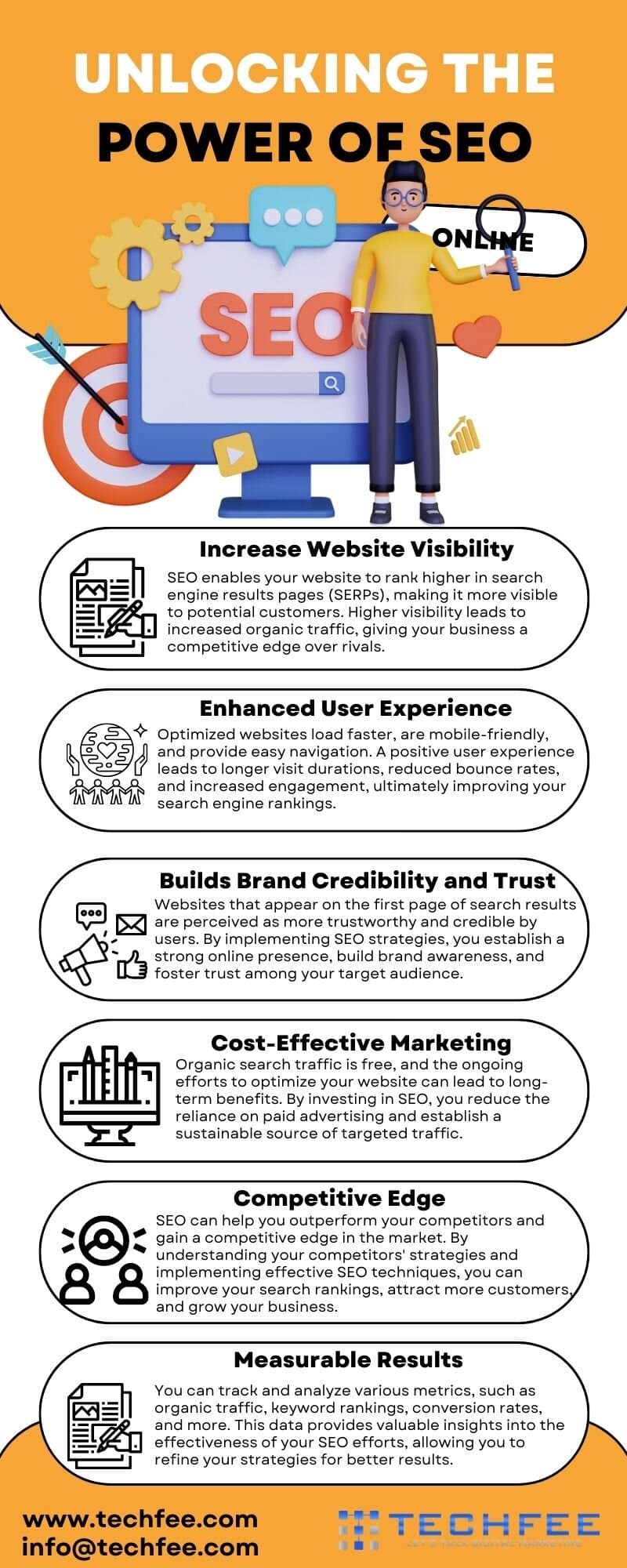
In short, SEO serves as a vital tool for driving organic traffic, enhancing user experience, and maximizing businesses’ online presence. Its multifaceted benefits make it essential to any effective digital marketing strategy.
Evolution Of SEO
Over the years, SEO has experienced a significant transformation, moving from a simplistic keyword-focused approach to a more complex and multifaceted strategy.
In its early stages, SEO primarily revolved around keyword density and meta tags, aiming to enhance website rankings. However, with the source of advanced technology and the ever-changing algorithms of search engines, SEO has evolved into a comprehensive and user-centric practice.
One pivotal aspect in the evolution of SEO is the growing importance of high-quality content. Search engines now prioritize websites that offer valuable and relevant information to users. This shift has prompted website owners and marketers to concentrate on creating engaging and informative content that satisfies search engine algorithms and resonates with their target audience.
Another meaningful development in the evolution of SEO is the rise of mobile optimization. As smartphones became more universal and an increasing users accessed the internet through mobile devices, search engines have adapted accordingly by prioritizing mobile-friendly websites. SEO strategies now encompass optimizing sites for mobile responsiveness, ensuring fast loading times, and improving user experience on smaller screens.
Furthermore, integrating social media signals into SEO has revolutionized the landscape. Search engines now consider a website’s social media presence and engagement indicators of its credibility and relevance.
Brands and businesses leverage social media platforms to connect with their audience and enhance their SEO rankings.
The evolution of SEO is still an ongoing process. As technology advances, SEO strategies adapt to new trends and developments. Emerging areas such as voice search, artificial intelligence, and machine learning are shaping the future of SEO.
What Are SEO Ranking Factors
Indeed, there exist numerous Google ranking factors, and Google consistently evolves and fine-tunes its algorithm to ensure the utmost user experience. However, it is crucial to prioritize 12 specific factors shown up in the chart.
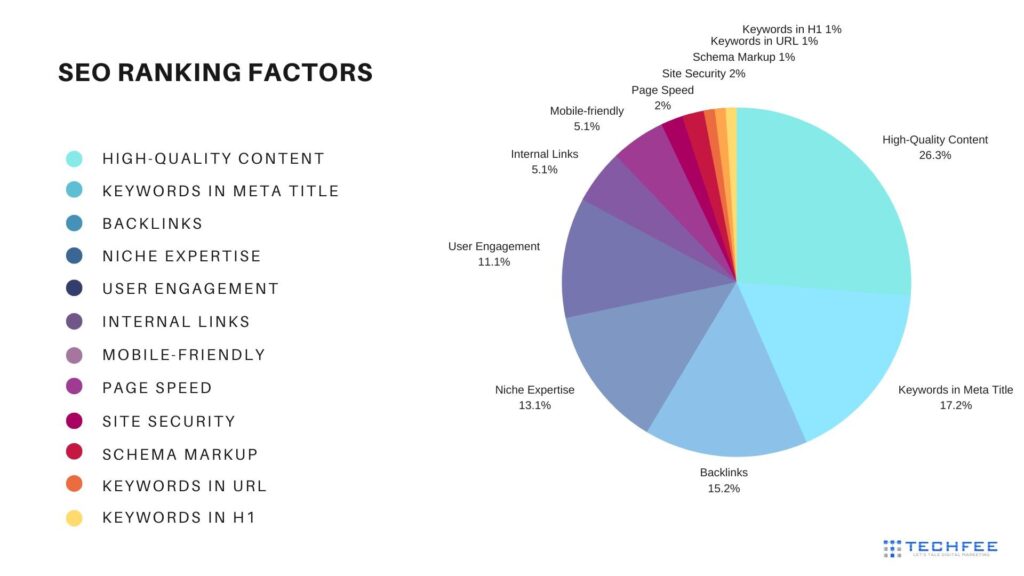
FirstPageSage provides a list of the most significant factors influencing Google’s rankings and the corresponding weights assigned to them.
Fourteen years ago, First Page Sage initiated an ongoing research project on Google’s algorithm and has publicly shared its findings for the past few years.
How To Improve SEO
Numerous effective strategies can help you enhance your SEO efforts. Firstly, conducting thorough keyword research is crucial. You can improve your chances of appearing in search engine results by identifying relevant keywords and strategically incorporating them into your website’s content, meta tags, and headings. It’s also essential to optimize your website’s loading speed, as it directly impacts user experience and search engine rankings.
- Techniques such as compressing images, minifying code, and leveraging browser caching can significantly boost your website’s speed. Another critical aspect of SEO improvement is creating high-quality and original content.
- Regularly publishing engaging and informative articles, blog posts, and other forms of content can attract more visitors and encourage them to spend more time on your site, signaling to search engines that your website is valuable and relevant.
- Building a solid network of reputable backlinks is crucial for improving SEO. Backlinks from authoritative websites indicate to search engines that your site is trustworthy and deserves higher rankings.
- Engaging in guest blogging, reaching out to influencers, and creating shareable content are effective ways to acquire valuable backlinks. Lastly, optimizing your website for mobile devices is essential, considering the growing number of users accessing the internet through smartphones and tablets. Implementing a responsive design, optimizing images for mobile viewing, and ensuring fast loading speed on mobile devices can significantly enhance your SEO performance.
By implementing these strategies, you can elevate your website’s SEO, increase visibility in search engine results, and ultimately drive more organic traffic, leading to tremendous online success.
How To Learn SEO
To master SEO, it’s essential to start with the fundamentals. Begin by acquiring crucial keyword research, on-page optimization, and link-building concepts. Keyword research entails identifying the specific words and phrases people commonly use when searching for information related to your website.
Additionally, keeping up with the latest SEO trends and algorithms is crucial. Since search engines are continuously evolving, you must adapt your strategies accordingly. Learning SEO requires combining practical experience, staying informed through reputable sources, reading blogs, watching video tutorials, and continuous experimentation.
By acquiring these skills and knowledge, you’ll be well-equipped to effectively optimize your website and attract organic traffic from search engines.
Set up Your Website Correctly For SEO Success
Optimizing your website for SEO will be much more convenient if your website is appropriately implemented. Let’s take a look:
Get A High-Quality Domain
Acquiring a top-notch domain is foremost essential to achieve success in SEO. Your domain serves as the virtual address for your website, making it crucial to select one that reflects your brand effectively and aligns with effective search engine optimization strategies.
A high-quality domain can significantly impact your website’s visibility, ranking, and success in search engine results. By opting for a relevant, short, concise, and memorable domain, you establish a strong foundation for your SEO efforts.
An intelligently chosen domain has the potential to enhance your website’s credibility, trustworthiness, and user experience, thus attracting organic traffic and improving your search engine rankings. Investing in a premium domain is wise for individuals seeking to elevate their SEO achievements and establish a strong online presence.
Utilizing a Website Platform
Creating a website requires careful consideration of the platform you choose. There are two main types: hosted platforms like Wix, Squarespace, Shopify, and Weebly and self-hosted platforms like WooCommerce, Joomla, Drupal, and WordPress.
Hosted platforms handle everything for you, offering ready-made designs and templates that you can easily customize without any coding knowledge.
On the other hand, self-hosted platforms require you to handle the hosting and installation yourself, but they still provide user-friendly interfaces for content editing.
Among these options, WordPress stands out as a popular choice recommended by most digital marketers. It offers high customization and extensibility, allowing you to tailor your website to your requirements. One of the key advantages of WordPress is its flexibility to edit the code directly.
Additionally, a wide array of tools and plugins are available, which can significantly simplify your work and enhance the functionality of your website. With WordPress, you can create a website that meets your needs and provides a seamless user experience for your visitors.
Use a Good Web Host
For a successful website, choose a reliable web host. Consider these three S when selecting the web host: Security, Server Location, and Support. It ensures accessibility, boosts SEO rankings and drives organic traffic.
Create A Positive User Experience
Google prioritizes ranking web pages based on their ability to deliver a positive user experience. User satisfaction plays a crucial role in Google’s algorithm, and factors like fast loading times, mobile-friendliness, and relevant content are key indicators.
Websites that focus on providing engaging content, easy navigation, and intuitive design have higher chances of ranking well. This encourages owners to create user-centric websites that offer value, address user queries, and ensure an enjoyable browsing experience.
By doing so, they can improve their rankings on Google and attract more organic traffic. And these are the secret SEO strategies to grab Google’s attention toward your site.
Create a Logical URL & Site Structure
A logical URL and site structure are crucial for a successful website. They provide organization, easy navigation, and improved search engine visibility.
Users can find information effortlessly by planning and designing a clear content hierarchy. Well-structured sites with descriptive URLs enhance the browsing experience and increase
Install SEO Plugins
Installing SEO plugins provide valuable tools to optimize your website for search engines. Features like keyword research, performance analysis, and content optimization empower you to make informed decisions and improve your SEO strategy.
Whether you’re a beginner or an expert, an SEO plugin simplifies the process and boosts your search engine rankings.
How to Do SEO for Website Step By Step
Search Engine Optimization involves a few significant steps:
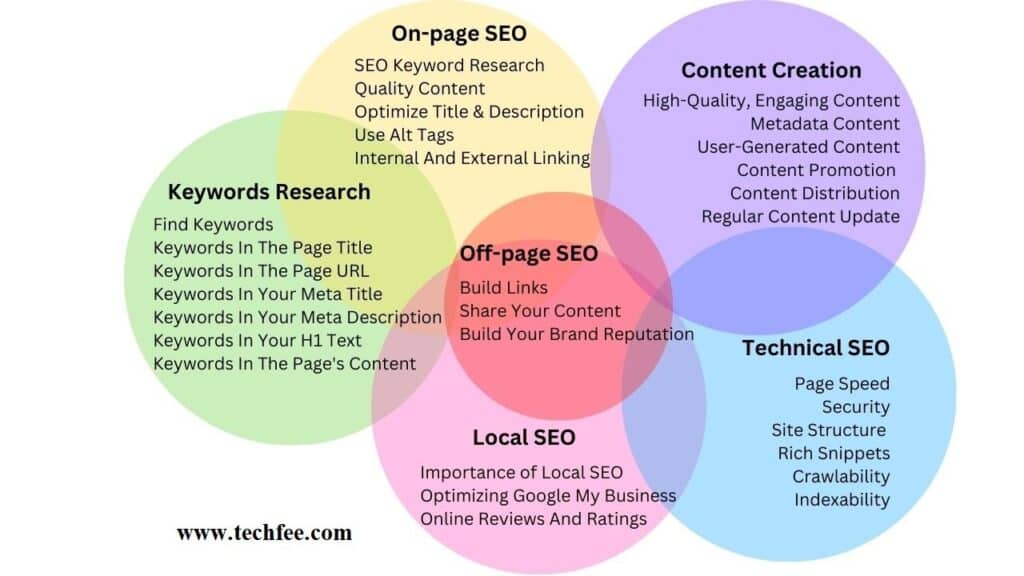
1) Keyword Research
Find Keywords
Keyword research is a vital part of successful SEO strategies. It involves using tools and techniques to discover valuable keywords that attract organic traffic. Businesses gain insights into their target audience’s search behavior by analyzing search volumes, competition, and user intent.
Keyword research helps businesses connect with their audience, increase organic traffic, and enhance their online presence.
Put Keywords In The Page Title
Putting keywords in the page title is especially important as it improves visibility and attracts the right audience. The page title, the first thing users see in search results, concisely summarizes the content.
Optimizing page titles with the right keywords enhances search engine rankings and drives organic traffic to your site.

Put Keywords In The Page URL
By incorporating targeted keywords in the URL, search engines can better understand the page’s content, leading to higher rankings. Crafting a concise, descriptive, and keyword-rich URL is recommended.
Additionally, a keyword-rich URL boosts the click-through rate by giving users a clear idea of what they can expect. Therefore, during keyword research, it is vital to consider the impact of incorporating relevant keywords in the page URL to enhance visibility and reach.
Put Keywords In Your Meta Title & Description
One key aspect is incorporating relevant keywords into your meta title and description. These elements help search engines understand the content and relevance of your web page.
By strategically using keywords in the meta title and description, you can attract targeted organic traffic and improve your search engine rankings.
Put Keywords In Your H1 Text
The H1 tag significantly impacts your content’s visibility and relevance to search engines. You can enhance your website’s SEO and attract targeted organic traffic by strategically selecting and integrating appropriate keywords.
Including the seed keyword in the H1 heading signals their importance to search engines and users. Effective keyword research and well-crafted H1 text boost your content’s discoverability in the competitive digital landscape.
Use Keywords In The Page’s Content
To effectively optimize your website, it is crucial to focus on keyword research and its utilization within your page’s content. You can improve your website’s visibility in search engine results by strategically incorporating relevant keywords into your text.
However, balancing keyword optimization and maintaining a natural language flow is essential. Avoid keyword stuffing, which can negatively impact user experience and search engine rankings.
By understanding the significance of keywords and using them thoughtfully, you can enhance your website’s search engine optimization and attract organic traffic.
Note: Let’s take an in-depth look at how to do keyword research that can help you boost website traffic.
2) Content Creation
Creating High-Quality, Engaging Content
Creating high-quality and engaging content for SEO involves understanding the target audience and conducting thorough research.
Content creators can develop relevant and authoritative content that aligns with search engine algorithms by identifying relevant topics and keywords.
Incorporating visual media, maintaining a clear tone, and optimizing with keywords, meta tags, and headings are essential. The goal is to attract organic traffic and provide genuine value to readers for long-term success in the digital landscape.
Metadata Content
One crucial aspect is crafting meaningful metadata content, including meta titles and descriptions, that accurately represent the webpage’s content.
By optimizing these elements with relevant keywords and engaging language, content creators can capture users’ attention and entice them to visit the website.
Well-crafted metadata content improves search engine rankings and enhances the user experience by providing precise and compelling information.
Maximizing SEO Benefits From User-Generated Content
User-generated content includes unique content, such as reviews, testimonials, comments, and social media posts. Incorporating user-generated content into your SEO strategy adds authenticity and credibility to your brand, engages your target audience, and improves organic search rankings.
Encouraging and promoting user-generated content allows businesses to tap into their customers’ voices, enhance SEO efforts, and promote a thriving online community.
Content Promotion And Distribution Strategies
Creating high-quality content is crucial for effective search engine optimization (SEO). Focusing on content promotion and distribution strategies is important to maximize its impact.
Social media platforms offer an excellent opportunity to share your content with a broader audience. Craft compelling pieces that encourage engagement and sharing. Guest blogging on reputable websites builds authority and expands your online presence.
Collaborating with influencers and experts amplifies visibility and generates valuable backlinks. Email marketing campaigns and keyword optimization improve search engine rankings and drive organic traffic.
Keep Updating Your Content Regularly
Creating engaging and impactful content for SEO requires one essential practice: regularly updating your content. Search engines value fresh and relevant information, so staying proactive is crucial.
By consistently refreshing your content, you provide value to your audience and establish credibility with search engines. Incorporating industry trends and new keywords and enhancing overall quality become possible through frequent updates.
Whether publishing new blog posts, refreshing existing articles, or expanding your resource library, keeping your content up-to-date boosts search engine rankings, attracts organic traffic, and strengthens online visibility.
3) On-Page SEO
Start With SEO Keyword Research
On-Page SEO is a vital aspect of effective search engine optimization. It begins with thorough keyword research, identifying relevant terms that resonate with your content and target audience.
By strategically incorporating these keywords into page titles, headings, and content, you demonstrate the value and relevance of your website to search engines. Optimizing URLs, using descriptive alt tags for images, and ensuring mobile-friendliness further enhance your On-Page SEO.
Create Quality Content Targeting Those Keywords
Creating quality content targeting specific keywords enhances visibility and attracts targeted traffic, contributing to online success.
Optimize Title & Description
One crucial aspect of On-Page SEO is optimizing web page titles and description tags. The title tag should contain targeted keywords that accurately represent the page’s content while being concise and compelling to attract users.
Similarly, the meta description briefly summarizes the page’s content, incorporating relevant keywords and enticing users to click.
Use Alt Tags
Another crucial aspect of On-Page SEO is the use of Alt tags. Alt tags, short for alternative text, are HTML attributes used to describe images on a webpage. By including relevant and descriptive keywords within Alt tags, website owners can enhance the understanding of images by search engines and improve the accessibility of their content.
Internal And External Linking
Internal linking involves strategically adding links within your content to relevant pages on your website. It improves user experience and helps search engines better discover and index your content.
Conversely, external linking involves including outbound links to authoritative sites, enhancing credibility, and providing value to readers. A well-executed linking strategy contributes to on-page SEO success, boosting visibility and organic rankings.
Note: You must go through the complete guide to on-page SEO techniques.
4.) Off-Page SEO
Build Links To Your Website Through Guest Blogging
Off-Page SEO is crucial for boosting website visibility. One effective strategy is guest blogging, where you contribute articles to reputable websites.
By building backlinks, you gain credibility and improve search engine rankings. Focus on collaborating with high-quality sites for authoritative backlinks. This Off-Page SEO technique enhances organic traffic and overall online visibility.
Share Your Content On Social Media
Sharing content on social media platforms is key if you are looking for the answer to how to do SEO. Utilize platforms like Facebook, Twitter, Instagram, and LinkedIn to reach a wider audience and drive traffic.
Engage with users, build brand awareness, and attract potential customers. Social media shares create valuable backlinks, enhancing website authority. Incorporate a solid social media strategy for maximum impact and online presence.
Build Your Brand Reputation
Building brand reputation through off-page SEO strategies is one of the compelling methods of “how to do SEO.”
It involves strategies like high-quality backlinks, guest blogging, and active participation in industry discussions. These efforts showcase your expertise, gain recognition, and strengthen your online presence, establishing you as a trusted authority.
Note: Grab all the hacks of off-page SEO techniques to get help with SEO improvements.
5) Technical SEO
Page Speed
Technical SEO includes optimizing page speed, which refers to how quickly a webpage loads. It’s crucial for a good user experience and higher search engine rankings. Slow-loading pages lead to high bounce rates and lower conversions. Search engines like Google prioritize fast-loading sites.
To improve page speed, developers can optimize images, use browser caching, minimize CSS and JavaScript files, and reduce server response time. Prioritizing page speed enhances user satisfaction, boosts organic visibility, and drives more website traffic.
Security
Technical SEO plays a vital role in ensuring website security. It involves implementing SSL certificates, firewalls and conducting security audits. By optimizing code and eliminating vulnerabilities, it protects user data and maintains a strong online presence.
Site Structure & Rich Snippets
Optimizing your site structure and incorporating rich snippets are vital for improving search engine visibility. An organized site structure helps search engines crawl and index pages efficiently, enhancing rankings and user experience.
Implementing a logical hierarchy of categories and subcategories simplifies website navigation.
Crawlability/Indexability
Crawlability focuses on making your site easy for bots to navigate, while indexability ensures your pages are eligible for search engine indexes. Optimize your website’s structure, use clean code, and employ XML sitemaps to enhance crawl ability and indexability.
Implement best practices like unique meta tags, proper canonicalization, and avoiding low-quality content. Regular site audits and monitoring crawl errors help identify and resolve technical issues. Prioritizing crawl ability and indexability improves search engine visibility and organic traffic.
Note: There are 30 Powerful Technical SEO techniques to improve website rankings; you must explore ones.
6) Local SEO
Importance of Local SEO
Local SEO plays an important role in boosting the online visibility of businesses within their local areas. By optimizing websites for local search, businesses can appear prominently in search results, making it easier for potential customers to find them.
This involves optimizing content, meta tags, and using location-specific keywords. Managing online reviews, creating local business listings, and leveraging online directories further, enhance local presence.
Investing in local SEO is essential for businesses to stand out, build credibility, and attract targeted traffic, leading to increased conversions and growth.
Optimizing Google My Business Listing
Optimizing your Google My Business listing is essential for improving local SEO. Your Google My Business profile is a digital storefront providing valuable information to potential customers.
Ensure accuracy and consistency in your business name, address, and phone number (NAP) across all platforms. Use high-quality images that showcase your offerings and create a positive impression. Encourage satisfied customers to leave reviews to build trust.
Take advantage of features like accurate business hours and prompt customer responses. This is how to do SEO for google my business; optimizing your Google My Business listing enhances visibility in local search results and attracts more customers to your physical location.
Generating Online Reviews And Ratings
One effective strategy is generating online reviews and ratings. Positive feedback builds trust and attracts potential customers. Businesses should encourage customers to leave reviews on platforms like Google and Bing.
Responding to reviews shows commitment to customer satisfaction. Consistently generating positive reviews strengthens local SEO efforts and increases visibility and customer acquisition.
Note: Explore the complete guide on How to do Local SEO
How To Do SEO In Google (Getting On Google)
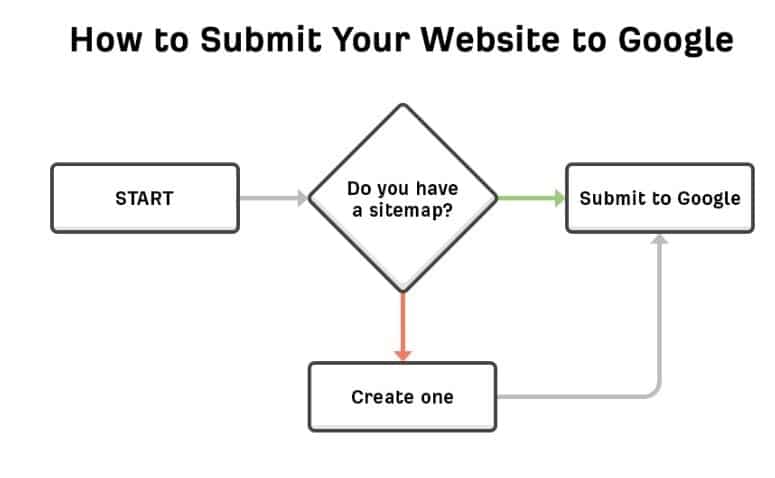
Connecting your website with Google Search Console ensures it gets noticed on Google. This step allows you to optimize your website’s performance and ensure proper indexing on Google’s search engine.
By integrating your website with Google Search Console, you gain valuable insights into how users discover and interact with your site while also being able to monitor its visibility in search results.
This powerful tool enables you to address indexing issues, submit your website’s sitemap for better crawling, and analyze essential metrics such as search queries and click-through rates.
Additionally, Google Search Console provides proactive notifications about potential issues affecting your website’s visibility, allowing you to take necessary measures to improve its ranking and attract more organic traffic.
By leveraging the capabilities of Google Search Console, you can enhance your website’s online presence and achieve greater visibility on Google’s search platform.
Measuring And Analyzing SEO Performance
When it comes to measuring and analyzing the performance of your SEO efforts, it’s crucial to set up Google Analytics. By incorporating the following key points, you can effectively monitor and evaluate the success of your SEO strategies.
First and foremost, keeping track of keyword rankings and organic traffic is essential to understanding how well your website performs in search engine results. This valuable information lets you identify which keywords drive the most traffic and make necessary adjustments to optimize your content.
Additionally, monitoring search visibility provides insights into your website’s overall presence and competitiveness in search engine rankings. It helps you determine how visible your website is to your target audience.
Moreover, measuring engagement metrics such as conversion rate, click-through rate, page views, and bounce rate offers valuable insights into how users interact with your website. These metrics play a significant role in assessing your SEO strategies’ effectiveness and identifying improvement areas.
By leveraging the power of Google Analytics and thoroughly analyzing these performance indicators, you can make well-informed decisions to enhance your SEO efforts and achieve meaningful results.
Utilize SEO Tools
SEO tools are crucial in digital marketing, assisting website optimization and attracting organic traffic. Among the special tools are Google Analytics, Google Search Console, keyword research tools, and SEO software.
Google Analytics is invaluable, offering profound insights into website metrics, user behavior, and conversion rates. Marketers benefit from tracking key performance indicators, identifying traffic sources, and understanding their audience’s demographics.
Complementing it, Google Search Console enables website owners to monitor their site’s search presence, submit sitemaps, and rectify any issues that may impact search visibility.
Keyword research tools like Ubersuggest and Google Keywords Planner are essential in uncovering relevant keywords and analyzing search volume, competition, and potential traffic. With this knowledge, marketers can optimize content and effectively target the right audience.
Lastly, SEO software like SEMRUSH and Ahrefs provides a comprehensive suite of tools, including competitor analysis, rank tracking, and insightful reporting, facilitating overall website optimization.
By harnessing the power of these SEO tools, marketers can make informed decisions, boost website visibility, and achieve long-term success amidst the fiercely competitive online landscape.
Keeping Up With SEO Trends and Updates
Staying updated with the latest SEO trends and updates is essential to stay ahead in the dynamic world of digital marketing. As search engine algorithms constantly evolve, it becomes crucial to stay informed about any algorithm changes that can impact your website’s performance.
By keeping a finger on the pulse of these updates, you can effectively optimize your website and maintain its visibility and competitiveness in search engine rankings.
- Engaging with SEO communities and forums offers a valuable opportunity to connect with like-minded professionals, share experiences, and gain insights into the latest trends.
- Participating in discussions allows you to broaden your understanding of SEO best practices and stay in tune with the ever-changing industry.
- Another helpful approach is to subscribe to reputable SEO newsletters and blogs. By doing so, you can receive valuable information and updates directly to your inbox. These newsletters and blogs often offer industry insights, case studies, and actionable tips to help you navigate the SEO landscape.
Regularly reading and absorbing this content empowers you to remain informed about the latest trends, algorithm changes, and emerging strategies.
Conclusion
In conclusion, becoming skilled in SEO is crucial for individuals seeking to optimize their website’s visibility and attract organic traffic.
Understanding the fundamentals of SEO, such as conducting thorough keyword research, implementing step-by-step website optimization techniques, and effectively measuring and analyzing SEO performance, spreads the foundation for success.
Moreover, by strategically getting your website indexed by search engines like Google and employing proven SEO strategies and best practices, including creating valuable and engaging content, optimizing for mobile devices, and leveraging social media, you can significantly enhance your website’s performance.
Remember, staying updated with the ever-evolving SEO landscape and continuously refining your strategies will lead to long-term success in driving targeted traffic and maximizing your online presence.
Frequently Asked Questions
What is the ideal keyword density?
The concept of ideal keyword density has evolved. Instead of fixating on a specific keyword density, creating high-quality content relevant and valuable to the reader is recommended. Keyword usage should be natural and contextual, prioritizing the target audience's needs. The focus should be on producing content that demonstrates expertise and meets user expectations rather than solely relying on keyword density for search engine rankings.
How long does it take to see SEO results?
The timeline for seeing SEO results can vary based on various factors. Generally, it takes time for search engines to index your website and assess its authority and relevance.
Typically, noticeable organic search rankings and increased traffic improvements can be observed within a few weeks to several months.
However, SEO is an ongoing process, and results evolve as optimization strategies are refined. Factors such as industry competitiveness, content quality, backlink strength, and website health impact the speed of SEO progress. Patience, consistency, and adaptability are crucial for long-term success in search engine rankings.
Is SEO a one-time effort?
SEO is an ongoing effort that requires consistent attention. It's not a one-time task. Various strategies like optimizing content, improving site structure, conducting keyword research, building quality backlinks, and monitoring data are necessary to improve a website's visibility and ranking. With search engines evolving and competition increasing, continuous SEO work is essential for maintaining and improving search engine rankings and organic traffic.
Are there any shortcuts to SEO success?
While there are no guaranteed shortcuts to SEO success, following these tips can improve your chances:
- Create valuable content for your target audience.
- Use keywords strategically throughout your website.
- Optimize your website's structure and navigation.
- Ensure your website is mobile-friendly.
- Earn high-quality backlinks from reputable websites.
- Engage with your audience on social media.
- Regularly update and monitor your website's SEO performance.
What is the difference between organic and paid search results?
Organic search results are natural listings based on relevance and quality without paid advertising. Paid search results are ads that appear alongside or above the organic results, where advertisers pay for placement.
Does SEO work for all types of websites?
Yes, SEO (Search Engine Optimization) can be effective for all types of websites. SEO principles are adaptable to any website, regardless of its specific industry, niche, or scale. SEO involves optimizing website elements to enhance visibility and ranking on search engine result pages (SERPs). While the strategies and techniques employed may differ based on the website's objectives and nature, the fundamental principles of SEO, such as conducting keyword research, optimizing on-page elements, building quality backlinks, and enhancing user experience, are applicable across the board.
Are there any risks or penalties associated with SEO?
SEO carries risks and penalties. Violating search engine guidelines can result in penalties such as lower rankings or removed from search results. Algorithmic changes can also impact visibility. Prioritizing search engines over user experience can lead to slow loading times and high bounce rates. Engaging in black hat techniques can damage reputation. To mitigate risks, follow ethical SEO practices, focus on quality content and user-friendly design, and stay updated with algorithm changes.
How can I recover from a Google penalty?
Recovering from a Google penalty can be challenging, but it's not impossible. Following the proper steps and staying committed can improve your chances of bouncing back.
Start by identifying the type of penalty you've received, whether manual or algorithmic. Then, thoroughly analyze your website for any issues that might have caused harm, such as poor content quality or unnatural backlinks. Once you've identified the problems, take prompt action to fix them, whether by improving your content, disavowing harmful backlinks, or enhancing the user experience.
Be sure to submit a reconsideration request if it's a manual penalty, explaining the steps you've taken to rectify the situation. Alongside that, focus on building high-quality backlinks and optimizing your on-page elements. Keep a close eye on your website's performance and make necessary adjustments as you monitor its progress.
Remember, recovering from a Google penalty takes time and effort, but with determination and adherence to best practices, you can regain your website's visibility and rankings.
How often should I update my website's content for better SEO?
To improve your website's SEO, updating your content regularly is essential. While the frequency can vary, updating at least once a month is recommended. This keeps your site fresh and signals to search engines that it's active and engaging. Monitor your site's performance and user engagement to determine if more frequent updates are necessary. Remember to prioritize quality and relevance when creating content to provide the best user experience.
